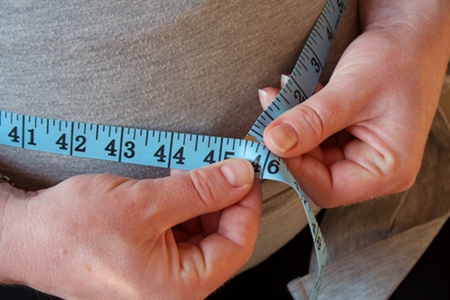Middle-Age Weight Gain: Stay Away From the Hot Dogs and Chips
Middle-Age Weight Gain: Stay Away From the Hot Dogs and Chips

As you approach that time in your life known as middle age, it’s long been the tradition that the key to staying fit during this time of your life is to eat less and exercise more.
Even though this has been the motto for most adults approaching this transition in their lives, new studies are revealing that certain behaviors—including watching TV and eating potato chips—are some of the major culprits of our widening waistlines.
“This study took men and women who ranged between the ages of 33-60, and followed them for four years,” says Carrie Wissemeier, a Registered Dietitian and one of the lead dietitians for bistroMD. “During this time period, adults who ate one single serving of potato chips gained weight faster and more rapidly. In fact, the potato chips were associated with 1.7 pounds of extra weight gained per year, within this four year time frame.”
With this new research, and with health professionals questioning the habits of people who experience middle-age weight gain, our dietitian explains the science behind this recent study, and how you can avoid middle-age weight gain.
Eat More, or Eat Less?
“The great thing about this study is that it actually revealed that eating less is not the most effective way to lose weight,” says Carrie. “What this study showed is that you can still eat larger portions, they just need to be servings of the right foods.”
In this study, certain foods appeared to help fight off weight gain.
The study, which is featured in the upcoming edition of the New England Journal of Medicine, used data from three large government-funded studies over a 20 year period to determine what foods contributed most to middle-age weight gain.
“When it comes to eating during middle age, it isn’t always about moderation,” says Carrie. “And, your lifestyle behaviors can also contribute just as much to your weight gain as the food you consume.”
One of the key things revealed in this study is that processed foods should be avoided.
“The bad thing about processed foods is that they tend to be high in sodium, bad sugars, carbohydrates, and fats,” says Carrie. “Processed foods are also low in dietary fiber, vitamins, and minerals.”
When it comes to carbohydrates, it’s the simple ones you should avoid, as they can be starchy and problematic.
“This study reveals that adults who ate foods with simple carbohydrates, like potato chips, had an average yearly increase in their weight gain of about two pounds,” says Carrie. “This calculation also takes into account a lack of physical activity.”
When it comes to eating more or eating less, the key is to make sure you are satisfied with your portions, but that your meals are properly balanced with the right nutrients.
“Your meals should be balanced with protein, carbohydrates, and healthy fats,” says Carrie. “This is especially important during middle age, as the biological changes taking place in your body can influence the efficiency of your metabolism.”
Practice a Healthy Lifestyle
“Many of the people in this study were shown just how fast weight gain can catch up to them,” says Carrie. “This is due to the fact that many of the participants engaged in daily habits that contributed to their weight gain.”
People who ate high-starchy foods, and neglected physical activity in this study gained an average of 3.4 pounds per year due to these choices.
Most of this weight gain was actually contributed to not exercising, and too much time spent in front of the television.
“For each additional hour of TV watched, the participants gained an extra one-third of a pound every four years,” says Carrie.
The study also found that those who slept for less than six hours per night, or more than eight, experienced an increase in weight gain.
Oversleeping or not getting enough rest can have a big impact on your weight. This is especially true when it comes to abdominal fat retention.
“Physical inactivity, combined with little or too much sleep can lead to abdominal weight gain,” says Carrie. “When this happens, your risk of developing conditions like heart disease and diabetes increases significantly.”
In conjunction with a healthy diet, exercise is vitally important. Participants in this study who exercised regularly actually gained as much as 1.76 fewer pounds than expected.
“Successful weight loss is all about knowing what kinds of foods to eat,” says Carrie. “This, in combination with an effective exercise plan, will help you lose weight and keep it off, especially during middle age.”
-
Tips to Lose Weight despite Big Appetite
Is being a foodie weighing you down; literally? Well, there are millio
-
The Best Way To Lose Your Weight And Keep It Off
Losing weight may seem like a difficult task, but it does not ha
-
Meal Flipping For Weight Loss
In todays society, there are three main meals that almost all families
-
Successful Weight Loss For Life
There are many ways to lose weight, including a myriad of different d
-
Weight Loss Tips that Work Quick for Women
There are lots of great diets that work
-
Healthy Kitchen Staples to Start 2012
If you want to make over your health, refrigerator, and pantry, then m
- DON'T MISS
- 5 Healthy Tips To Weight Loss
- Ten Easy Ways To Lose Weight
- Obesity poses greater risks for men: Study
- How To Lose The Last 10 Pounds
- Whats the Deal with Detox Diets?
- Your imagination is the first step to life long weight loss
- What Is Weight Loss Hypnosis?
- They Lie To You About Your Weight
- Status Update: Social Media Use May Help You Lose Weight
- Tactics To Drop Pounds Using A Proper Diet Program




